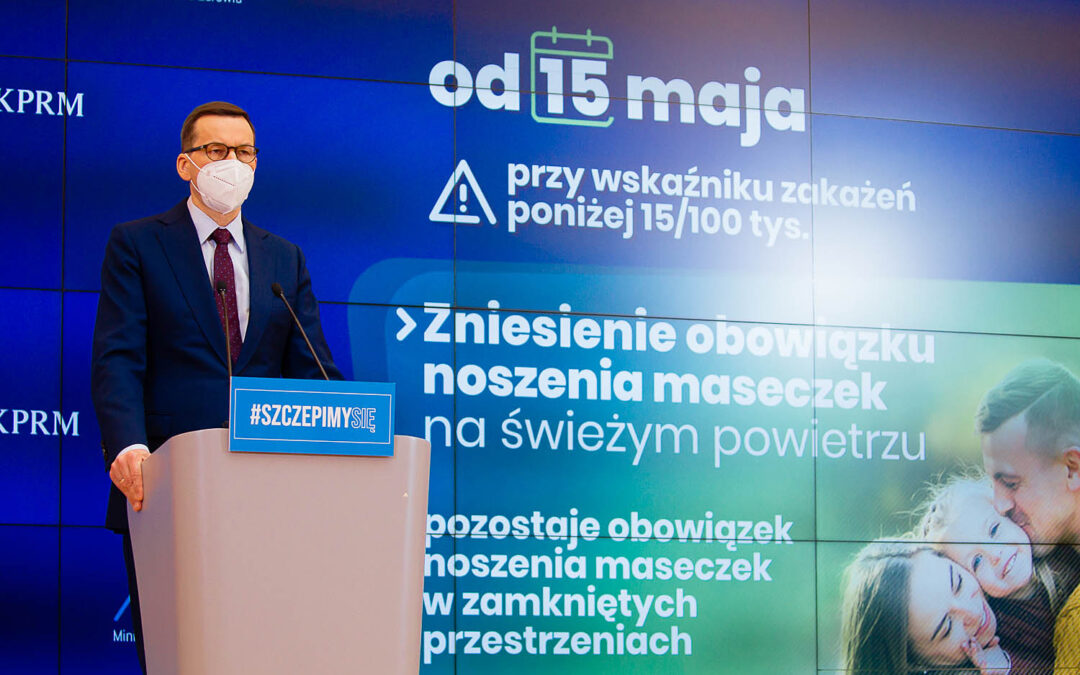Poland’s government has confirmed that masking will no longer be compulsory in outdoor public places from 15 May, as the number of new COVID-19 cases has dropped below the required threshold.
Meanwhile, and also in keeping with the timetable announced last week, hotels are allowed to reopen from midnight tonight and the government has also published an ordinance for further restrictions to be lifted from 29 May, including the reopening of restaurants and certain indoor and outdoor events.
The government had announced that the obligation for people to cover their nose and mouth in outdoor public spaces would be lifted from 15 May if the average daily infection rate had fallen below 15 per 100,000 people. By yesterday, the figure had already dropped to 12.5, its lowest level since November.
Consequently, in an ordinance published yesterday, the government lifted the requirement to mask outdoors if distancing of 1.5 metres can be maintained. The regulations include exceptions for certain “generally accessible places” – such as cemeteries and parking areas – where masks must be used.
Masks also remain compulsory in indoor public spaces – including shops, churches, public transport and shared residential spaces, such as staircases. However, they will no longer be required in some cases, including for students taking end-of-school exams and couples during their wedding.
The new rules come into force on 15 of May and are initially in place until 5 June, after which they are likely to be extended.
As previously announced, from tomorrow, hotels will be allowed to reopen at maximum 50% occupancy (though their restaurants and spa/wellness facilities remain closed). From next weekend, restaurants will be allowed to serve food outside, with obligatory mask wearing for staff as well as guests taking their seats.
Moreover, according to the new ordinance, while events are officially still banned between 29 May and 5 June, the list of exceptions has been extended to include professional gatherings, indoor meetings in an organiser’s home of up to 25 people (with people living at the address excluded from the limit), and outdoor gathering of up to 50 people.
Those who have already been fully vaccinated will not count towards the limit of attendees in the case of indoor and outdoor events. As of Friday morning, Poland has fully vaccinated over 3.4 million people, over 9% of the population.
Fitness clubs and gyms will also be allowed to open from 29 May, with a limit of one person per 15 square metres. This restriction does not apply to such centres operating in a therapeutic capacity or for Polish Olympic and Paralympic athletes.
From 15 May, outdoor cinemas and theatres will also be able to operate with up to 50% occupancy and audiences will be allowed at outdoor sports events up to 25% of capacity (including at the UEFA Europa League final in Gdańsk on 26 May, which up to 9,500 spectators will be allowed to attend).
Nurseries, preschools and the first three years of primary school have already reopened, with the remaining years of primary school and first four years of secondary school set to return to “hybrid” online and in-person teaching from 15 May. All schools are due to fully reopen on 29 May.
Some students have protested against the brief resumption of classes before the summer holidays. An online petition calling the decision “unnecessary” and “stressful” has received almost 600,000 signatures so far.
On 1 May, the limit on the number of people who can practise outdoor sport doubled to 50 and indoor sports facilities, including swimming pools, were allowed to admit organised groups of children and teenagers.
Art galleries, museums and shopping centres have also reopened with limits on the number of people allowed in, and restrictions on church attendance were loosened.
On Monday this week, Poland recorded its lowest daily number of new coronavirus cases (2,296) since early November. The numbers of deaths and hospitalisations have also been declining rapidly from their all-time peaks last month.
The outbreaks of the Indian variant have been found in Warsaw and Katowice, which are the two cities where a number of nuns and homeless people recently became infected after one nun returned from India and later tested positives for coronavirus https://t.co/UAnOV4uUDZ
— Notes from Poland 🇵🇱 (@notesfrompoland) May 4, 2021
Main image credit: Krystian Maj/KPRM (under CC BY-NC-ND 2.0)

Maria Wilczek is deputy editor of Notes from Poland. She is a regular writer for The Times, The Economist and Al Jazeera English, and has also featured in Foreign Policy, Politico Europe, The Spectator and Gazeta Wyborcza.




















